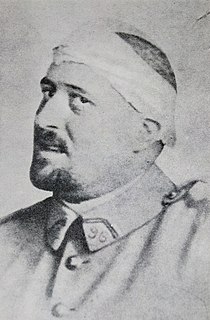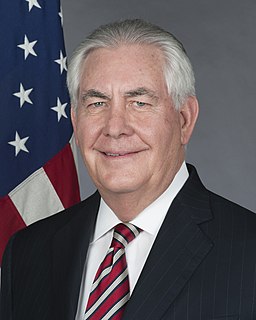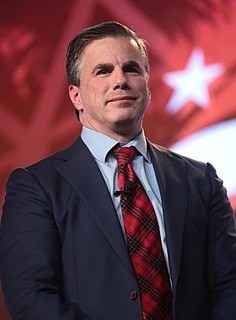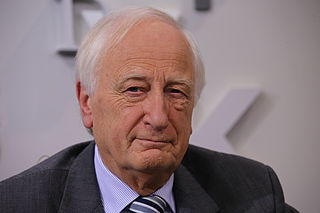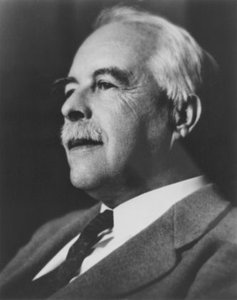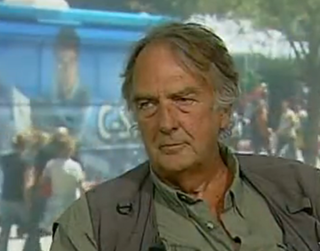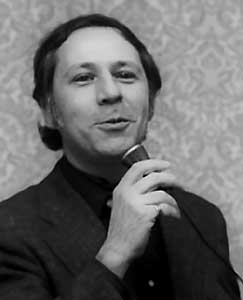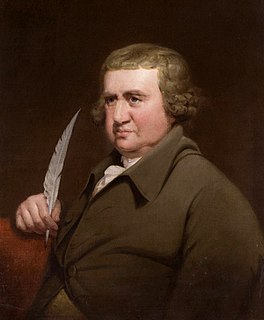Top 772 Collapse Quotes & Sayings - Page 13
Explore popular Collapse quotes.
Last updated on April 16, 2025.
When the people of a nation stop communicating, they lose the common purpose that made them great. Their cities become ghost towns. People live aimlessly because they have no cause for which they are willing to die. The cry of the populace is 'Just leave me alone'. Perhaps the ultimate hell is that the wish will be granted. It is not unlikely that our own nation will collapse not through an explosive roar, but through a deafening silence. This silence must be broken in our generation. We may never get another chance.
The secret of success is to realize that the crisis on our planet is much larger than just deciding what to do with your own life, and if the system under which we live the structure of western civilization begins to collapse because of our selfishness and greed, then it will make no difference whether you have $1 million dollars when the crash comes or just $1.00. The only work that will ultimately bring any good to any of us is the work of contributing to the healing of the world.
‘Cause sometimes you just feel tired, feel weak
And when you feel weak, you feel like you wanna just give up
But you gotta search within you
And gotta find that inner strength
And just pull that shit out of you
And get that motivation to not give up
And not be a quitter, no matter how bad you wanna just fall flat on your face, and collapse.
Place no hope in the feeling of assurance, in spiritual comfort. You may well have to get along without this. Place no hope in the inspirational preachers of Christian sunshine, who are able to pick you up and set you back on your feet and make you feel good for three or four days-until you fold up and collapse into despair. Self-confidence is a precious natural gift, a sign of health. But it is not the same thing as faith. Faith is much deeper, and it must be deep enough to subsist when we are weak, when we are sick, when our self-confidence is gone, when our self-respect is gone.
The vow of silence, that's the mind-blower. See, talking is what I do... i t's a real need with me, a craving, I'm like a word junkie. I never shut up. I talk to myself, I talk in my sleep. The idea of voluntarily turning off that tap, I can't imagine it It'd be like, I don't know, all the rivers in the world just slammed to a stop. No churning, no flowing, no white water, just stillness, crushing stillness. I don't think I could stand it, locked up like that in my own psyche. I'd collapse into myself, I'd implode
More than one branch of the avant-garde, claiming to break with the bourgeois vision and mode of production, remains tied to it in spite of its denials and ex-communications. We are far from having overcome bourgeois thought or practices, despite the socialist "intermission" between the Russian revolution and the collapse of the Berlin wall. The avant-garde has lost its radical nature. On the other hand, "bourgeois theatre" is sometimes subtle enough to flirt with the avant-garde or to make "intelligent boulevard theatre.
In youth we may have an absolutely new experience, subjective or objective, every hour of the day. Apprehension is vivid, retentiveness strong, and our recollections of that time, like those in a time spent in rapid and interesting travel, are of something intricate, multitudinous, and long-drawn-out. But as each passing year converts some of this experience into automatic routine which we hardly note at all, the days and the weeks smooth themselves out in recollection to a contentless unit, and the years grow hollow and collapse.
What I have learned about corporate capitalism, roughly, is that it is an act of theft, by and large, through which a very few live very high off the work, invention, and creativity of very many others. It is the Grand Larceny of our particular time in history, the Grand Larceny in which a future of freedom which could have followed the collapse of feudalism was stolen from under our noses by a new bunch of bosses doing the same old things
There is an old song which asserts 'the best things in life are free.' Not true! Utterly false! This was the tragic fallacy which brought on the decadence and collapse of the democracies of the twentieth century; those noble experiments failed because the people had been led to believe that they could simply vote for whatever they wanted...and get it without toil, without sweat, without tears. Nothing of value is free. Even the breath of life is purchased at birth only through gasping effort and pain.
What they don't realize is that I'm not in the business to make clothes. I'm not in the business to make more money for myself, for Christ's sake. This is the reason Patagonia exists - to put into action the recommendations I read about in books to avoid environmental collapse. That's the reason I'm in business - to try to clean up our own act, and try to influence other companies to do the right thing, and try to influence our customers to do the right thing. So we're not going to change.
Without poets, without artists, men would soon weary of nature's monotony. The sublime idea men have of the universe would collapse with dizzying speed. The order which we find in nature, and which is only an effect of art, would at once vanish. Everything would break up in chaos. There would be no seasons, no civilization, no thought, no humanity; even life would give way, and the impotent void would reign everywhere.
Boris Yeltsin's period was characterized by a no less irresponsible attitude to people's lives, but in other ways. In his haste to have private rather than state ownership as quickly as possible, Yeltsin started a mass, multi-billion-dollar fire sale of the national patrimony. Wanting to gain the support of regional leaders, Yeltsin called directly for separatism and passed laws that encouraged and empowered the collapse of the Russian state. This deprived Russia of its historical role for which it had worked so hard, and lowered its standing in the international community.
It's important to understand the policy of the U.S. towards North Korea is to deny North Korea possession of a nuclear weapon and the ability to deliver that weapon. Our strategy has been to undertake this peaceful pressure campaign we call it enabled by the four no's.The four no's being that we do not seek regime change, a regime collapse, an accelerated reunification of the peninsula, and we do not seek a reason to send our forces north of the demilitarized zone.
Someone who doesn't make the (Olympic) team might weep and collapse. In my day no one fell on the track and cried like a baby. We lost gracefully. And when someone won, he didn't act like he'd just become king of the world, either. Athletes in my day were simply humble in our victory. I believe we were more mature then...Maybe it's because the media puts so much pressure on athletes; maybe it's also the money. In my day we competed for the love of the sport...In my day we patted the guy who beat us on the back, wished him well, and that was it.
I do believe that the collapse of the traditional media is catastrophic for our democracy, but I wasn't about to mythologize it. I understand its structural flaws, and the lies it tells, which are primarily, but not always, the lies of omission, and I wasn't going to leave that out. Knopf offered to publish the book but they said that an editor was going to "take out all the negativity," which, of course, I wasn't going to accept. I had been paid half my advance, and I had Nation Books buy the manuscript for that half.
I was too tired to think. I merely felt the town as a unique unreality. What was it? I knew -- the moon's picture of a town. These streets with their houses did not exist, they were but a ludicrous projection of the moon's sumptuous personality. This was a city of Pretend, created by the hypnotism of moonnight. -- Yet when I examined the moon she too seemed but a painting of a moon and the sky in which she lived a fragile echo of color. If I blew hard the whole shy mechanism would collapse gently with a neat soundless crash. I must not, or lose all.
A faith without some doubts is like a human body with no antobodies in it. People who blithely go through life too busy or indifferent to ask the hard questions about why they believe as they do will find themselves defenseless against either the experience of tragedy or the probing questions of a smart skeptic. A person's faith can collapse almost overnight if she failed over the years to listen patiently to her own doubts, which should only be discarded after long reflection.
One of the most powerful shocks of the Middle Passage is the collapse of our tacit contract with the universe-the assumption that if we act correctly, if we are of good heart and good intentions, things will work out. We assume a reciprocity with the universe. If we do our part, the universe will comply. Many ancient stories, including the Book of Job, painfully reveal the fact that there is no such contract, and everyone who goes through the Middle Passage is made aware of it.
Why shouldn’t we experience heartbreak? Through those doorways God is opening up ways of fellowship with His Son. Most of us collapse at the first grip of pain. We sit down at the door of God’s purpose and enter a slow death through self-pity. And all the so-called Christian sympathy of others helps us to our deathbed. But God will not. He comes with the grip of the pierced hand of His Son, as if to say, “Enter into fellowship with Me; arise and shine.” If God can accomplish His purposes in this world through a broken heart, then why not thank Him for breaking yours?
If the American people had known the truth - that Barack Obama, Hillary Clinton and other top administration officials knew that the Benghazi attack was an al-Qaida terrorist attack from the get-go - and yet lied and covered this fact up - Mitt Romney might very well be president. These documents also point to connection between the collapse in Libya and the ISIS war - and confirm that the U.S. knew remarkable details about the transfer of arms from Benghazi to Syrian jihadists.
When the newly formed middle class in China begins to perceive its interests and discovers the value of the rule of law, the existing power structure will lose its foundation. It is a process that no government can put a stop to in the long term. That also applies to some Arab countries, with some limitations. But we have to be patient. In the 1980s, nobody expected that the freedom movement in Poland would lead to the collapse of entire Eastern Bloc. That's why it would be a huge mistake were we to believe that authoritarian systems were indestructible.
The underlying strategy of the Fed is to tell people, "Do you want your money to lose value in the bank, or do you want to put it in the stock market?" They're trying to push money into the stock market, into hedge funds, to temporarily bid up prices. Then, all of a sudden, the Fed can raise interest rates, let the stock market prices collapse and the people will lose even more in the stock market than they would have by the negative interest rates in the bank. So it's a pro-Wall Street financial engineering gimmick.
You collapse a few times, and you put your head in your hands, and you say, "Oh my god, how am I gonna get through this?" You have a few of those nights, and then you get over it and you keep it moving. And those nights... As you get more used to the strain, I guess those nights are fewer and farther between. So that's the best you can hope for. It's a tough job and it's a lot to pull out of your brain.
How could Digital's collapse be so precipitous? It's because, in many ways, financial performance data is misleading. As you move up to the top of the market, you're getting rid of the less profitable products at the low end and adding business with more attractive margins at the high end. The rate of unit volume growth might be tapering off as you pursue these smaller markets, but your margins actually look better. So Wall Street rewards your stock price until you hit the ceiling.
The agricultural co-operative movement has been a severe ideological and political struggle from the very beginning. No cooperative can be established without going through such a struggle. Before a brand-new social system can be built on the site of the old, the site must be swept clean. Invariably, remnants of old ideas reflecting the old system remain in people's minds for a long time, and they do not easily give way. After a co-operative is established, it must go through many more struggles before it can be consolidated. Even then, the moment it relaxes its efforts it may collapse.
If we consider the actual basis of this information [i.e., intelligence], how unreliable and transient it is, we soon realize that war is a flimsy structure that can easily collapse and bury us in its ruins. ... Many intelligence reports in war are contradictory; even more are false, and most are uncertain. This is true of all intelligence but even more so in the heat of battle, where such reports tend to contradict and cancel each other out. In short, most intelligence is false, and the effect of fear is to multiply lies and inaccuracies.
The scientist is a practical man and his are practical (i.e., practically attainable) aims. He does not seek the ultimate but the proximate. He does not speak of the last analysis but rather of the next approximation. His are not those beautiful structures so delicately designed that a single flaw may cause the collapse of the whole. The scientist builds slowly and with a gross but solid kind of masonry. If dissatisfied with any of his work, even if it be near the very foundations, he can replace that part without damage to the remainder.
From Mount Hollywood, Los Angeles looks rather nice, enveloped in a haze of changing colors. Actually, and in spite of all the healthful sunshine and ocean breezes, it is a bad place - full of old, dying people, who were born old of tired pioneer parents, victims of America - full of curious wild and poisonous growths, decadent religious cults and fake science, and wildcat enterprises, which, with their aim for quick profit, are doomed to collapse and drag down multitudes of people.
The imagination doesn't crop annually like a reliable fruit tree. The writer has to gather whatever's there: sometimes too much, sometimes too little, sometimes nothing at all. And in the years of glut there is always a slatted wooden tray in some cool, dark attic, which the writer nervously visits from time to time; and yes, oh dear, while he's been hard at work downstairs, up in the attic there are puckering skins, warning spots, a sudden brown collapse and the sprouting of snowflakes. What can he do about it?
My one concern is that Hu Jintao may overestimate how much power China has in Pyongyang. They have - they do have influence, and they do have companies, and they do have economic relationships that could make life much more difficult in the north. Their balancing act is, "How much worse can we make it in the north without creating that which scares us more than anything, which is a collapse in the north." And then what happens to all those nuclear weapons. So they're going to work very hard to avoid that.
If drugs were legalized in the US, the Mexican economy would collapse since the earnings from drugs bring in more hard currency than its largest licit source, oil sales. Mexico is a corrupt state that has now become dependent on the earnings on an illegal product. But inevitably, the product will become legal and then Mexico will retain its corruption but must face the needs of its citizens now employed by the drug industry who have become steeped in violence and conditioned to higher incomes.
In a way, Che Guevara's fate was far worse than Simon Bolivar's. Guevara's collapse was complete: his intentions were forgotten, but his style was taken up by boutique owners (one of the fanciest clothes stores in London is called Che Guevara). There is no faster way of destroying a man or mocking his ideas than making him fashionable. That Che succeeded in influencing dress-designers was part of his tragedy.
You will learn that at higher levels of energy, our fields of prayer act very quickly to bring us exactly what we expect. If we fear, it brings to us what we fear. If we hate, it brings us more of what we hate. Thankfully when we go into these negative expectations, our prayer-fields collapse rather quickly because we lose our connection with the divine and are no longer outflowing love. But a fear expectation can still be powerful. That is why you must monitor your expectations carefully and set your field consciously.
Panic. You open your mouth. Open it so wide your jaws creak. You order your lungs to draw air, NOW, you need air, need it NOW. But your airways ignore you. They collapse, tighten, squeeze, and suddenly you're breaithing through a drinking straw. Your mouth closes and your lips purse and all you can manage is a croak. Your hands wriggle and shake. Somewhere a dam has cracked open and a flood of cold sweat spills, drenches your body. You want to scream. You would if you could. Cut you have to breathe to scream. Panic.
So here's a question from one who believed, only a week ago, that Baghdad might just collapse and that we might wake up one morning to find the Baathist militia and the Iraqi army gone and the Americans walking down Saadun Street with their rifles over their shoulders. If the Iraqis can still hold out against such overwhelming force in Umm Qasr for four days, if they can keep fighting in Basra and Nasiriyah – the latter a city that briefly rose in revolt against Saddam's regime in 1991 – why should Saddam's forces not keep fighting in Baghdad?
One of our great strength, world capitalism, is the most successful economic system possible, but has also become one of shorter and shorter cycles of evaluation. CEOs, companies, stocks, profits and debits change at an ever more accelerated pace in response to the demands of stockholders and the market. We have already experienced some consequences of the shortening cycle of decision making in business, but those are minor in relation to the grand systemic collapse that always eventually results from such accelerating and shortening periods for leadership goals.
Contemporary philosophers have exercised themselves with the problem of our knowledge of other minds. Enmeshed in the dogma of the ghost in the machine, they have found it impossible to discover any logically satisfactory evidence warranting one person in believing that there exist minds other than his own. I can witness what your body does, but I cannot witness what your mind does, and my pretensions to infer from what your body does to what your mind does all collapse, since the premises for such inferences are either inadequate or unknowable.
You know the theory of cell irritability? If you take an amoeba cell and poke it a thousand times, it will change and then re-form into its original shape. And then, the thousandth time you poke this amoeba, the cell will completely collapse and become nothing. That's kind of what it's like being famous. People say hi, how are you doing, and after the thousandth time, you just get angry; you really pop.
I believe that we will see a lot of destruction, but I believe that if we can see the right patterns and draw the right lessons from that destruction, we might be able to rebuild before it's too late. And then I have that ultimate optimism that even if we can't, life will rebuild itself. In a way, the global economy might collapse, but Gaia won't, and people's ingenuity won't. We will rebuild society, we will rebuild local economies, we will rebuild human aspirations.
While the poet entertains he continues to search for eternal truths, for the essence of being. In his own fashion he tries to solve the riddle of time and change, to find an answer to suffering, to reveal love in the very abyss of cruelty and injustice. Strange as these words may sound I often play with the idea that when all the social theories collapse and wars and revolutions leave humanity in utter gloom, the poet--whom Plato banned from his Republic--may rise up to save us all.
Much of American wealth is an illusion which is being secretly gnawed away and much of it will be completely wiped out in the near future....So what is the rest of your future? A grisly list of unpleasant events -- exploding inflation, price controls, erosion of your savings (eventually to nothing), a collapse of private as well as government pension programs, and eventually an international monetary holocaust which will sweep all paper currencies down the drain and turn the world upside down.
A new space race has begun, and most Americans are not even aware of it. This race is not about political prestige or military power. This new race involves the whole human species in a contest against time. All of the people of the Earth are in a desperate race against disaster... To save the Earth we must look beyond it, to interplanetary space. To present the collapse of civilization and the end of the world as we know it, we must understand that our planet does not exist in isolation.
That narrow stretch of sand knows nothing in the world better than it does the white waves that whip it , caress it , collapse on to it . The white foam knows nothing better than those sands which wait for it , rise to it and suck it in .but what do the waves know of the massed, hot, still sands of the desert just twenty , no , ten feet beyond the scalloped edge ? And what does the beach knows of depths, the cold, the currents just there, where-do you see it? - Where the water turns a deeper blue.
All work, the genuine work which we must achieve, is that which is most difficult and painful: the work on ourselves. If we do not freely take upon ourselves this pre-acceptance of the pain and torment, they will be visited upon us in an otherwise necessary individual and universal collapse. Anyone disassociated from his origin and his spiritually sensed task acts against origin. Anyone who acts against it has neither a today nor a tomorrow.
Another thing very injurious to the child is the tying and cutting of the navel string too soon, which should always be left till the child has not only repeatedly breathed but till all pulsation in the cord ceases. As otherwise the child is much weaker than it ought to be, a part of the blood being left in the placenta which ought to have been in the child and at the same time the placenta does not so naturally collapse, and withdraw itself from the sides of the uterus, and is not therefore removed with so much safety and certainty.
Ninety-nine percent of everyday things are things we don't need - that goes for regular visits to the hairdresser just as it does for clothing. What would it mean if we all consumed 20 percent less? It would be catastrophic. It would mean 20 percent less jobs, 20 percent less taxes, 20 percent less money for schools, doctors, roads. The global economy would collapse.
The West would be well advised to change its approach towards failing states. At present, no major power can find the correct ways and means - and the numbers of failing states are increasing. This year we watched the collapse of Mali, a consequence of the Libyan civil war. The south of Libya and Mali, and Niger too, are well on the way to becoming a no-man's land. After 9/11, George W. Bush and Tony Blair made the promise that they would not tolerate failed states because they could become a haven for terrorists. And today? The number increases.
The impact of QE on generating more lending by Wall Street to Main Street and in generating more employment and increasing overall investment in the economy is quite modest. QE probably limited the initial collapse of the economy in 2008, and likely had a very small positive impact on economic growth, but its broader impact on jobs and growth in the economy seems not very big.
Communism, like any other revealed religion, is largely made up of prophecies. When they fail to come off its clergy simply say that they will be realized later on. Thus, if we have another boom, they will argue that the collapse of capitalism is only postponed. The fact that the greatest booms ever heard of followed Marx's formal prophecy of the downfall of capitalism is already forgotten, just as millions have long since forgotten the early Christian prophecy that the end of the world was at hand. The first Christians accepted postponements as docilely as the Communists of today.
What does reflect reality very well is complexity theory, which comes from physics. I'm the one pioneering the idea of bringing it to capital markets. When you look at capital markets through the lens of complexity theory, you ask "what's the scale of the system?" Scale is a fancy word for size. What measures are you using? If you look at total debt, the concentration of assets in the five largest banks, what percentage of the total assets of the five largest banks are interconnected? What you see is a very densely connected, fragile system that could collapse at any moment.
But can we please stop insisting that if low-wage workers earn a little bit more, unemployment will skyrocket and the economy will collapse? There is no evidence for it. The most insidious thing about trickle-down economics is not the claim that if the rich get richer, everyone is better off. It is the claim made by those who oppose any increase in the minimum wage that if the poor get richer, that will be bad for the economy. This is nonsense.










